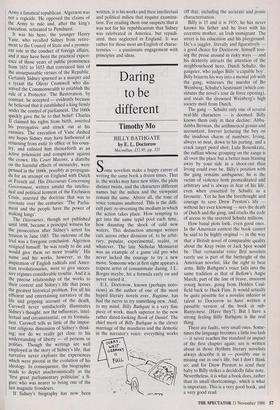Daring to be different
Timothy Mo
BILLY BATHGATE by E. L. Doctorow
Macmillan, £12.95, pp. 325 ome novelists make a happy career of writing the same book a dozen times. That is, the works may have new titles, the plots distinct twists, and the characters different names but the milieu and the viewpoint remain the same. Above all, the tone of voice remains unaltered. This is the diffi- cult part: re-inventing the medium in which the action takes place. How tempting to get into the same tepid pool each time, how daunting the shock of cold new waters. This distinction amongst writers cuts across other divisions of, to be arbit- rary, popular, experimental, realist, or whatever. The late Nicholas Monsarrat was an example of a game old pro who never lacked the courage to try a new move. Someone who at first sight appears a trapeze artist of consummate daring, J.L. Borges maybe, hit a formula early on and never varied it.
E.L. Doctorow, known (perhaps noto- rious) as the author of one of the most hyped literary novels ever, Ragtime, has had the nerve to try something new. And, to my mind, Billy Bathgate is a very fine piece of work, much superior to the now rather dated-looking Book of Daniel. The chief merit of Billy Bathgate is the clever marriage of the mandarin and the demotic in the narrator's voice: everything works off that, including the accurate and Ironic characterisation.
Billy is 15 and it is 1935; he has never known his father and he lives with his eccentric mother, an Irish immigrant. The street is his education and his playground. He's a juggler, literally and figuratively a good choice for Doctorow, himself toss- ing the prose around in risky ways — and his dexterity attracts the attention of the neighbourhood hero, Dutch Schultz, the gangster, who judges Billy 'a capable boy'. Billy brazens his way into a menial job with the gang, witnesses the murder of Bo Weinberg, Schultz's lieutenant (which con- stitutes the novel's tour de force opening), and steals the drowned Weinberg's high society moll from Dutch.
The gang — Schultz only one of several real-life characters — is doomed. Billy knows them only in their decline: Abba- dabba Berman, the arithmetical genius and accountant, forever lecturing the boy on the insidious charm of numbers; Irving, always so neat, down to his parting, and a crack target pistol shot; Lulu Rosenkratz, the ruffian whose grouping on the range is all over the place but a better man blasting away by your side in a shoot-out than Irving could ever be. Billy's position with the gang remains ambiguous; he is the victim of violence both premeditated and arbitrary and is always in fear of his life, even when cossetted by Schultz as a favourite. Yet he has the forethought and courage to save Drew Preston's life without her ever knowing sees the death of Dutch and the gang, and cracks the code of access to the secreted Schultz millions.
How banal plots look, even good ones. In the American context the book cannot be said to be highly original — in the way that a British novel of comparable quality about the Dray twins or Jack Spot would be. That vernacular voice Brit novelists rarely use is part of the birthright of the American novelist, like the right to bear arms. Billy Bathgate's voice falls into the same tradition as that of Bellow's Augie March; part of the line of brave, innocent young heroes, going from Holden Caul- field back to Huck Finn. It would actually be quite possible for a novelist inferior in talent to Doctorow to have written a passable version of the book in sub- Runycnese. (Have they?). But I have a strong feeling Billy Bathgate is the real thing.
There are faults, very small ones. Some- times the language becomes a little too lush it never reaches the standard or impact of the first chapter again; sex is written about in those rhythms literary novelists always describe it in — possibly one is missing out in one's life, but I don't think so; and for Drew Preston to send their baby to Billy strikes a decidedly false note. Nevertheless, it is what a book does, rather than its small shortcomings, which is what is important. This is a very good book, and a very good read.










































































 Previous page
Previous page